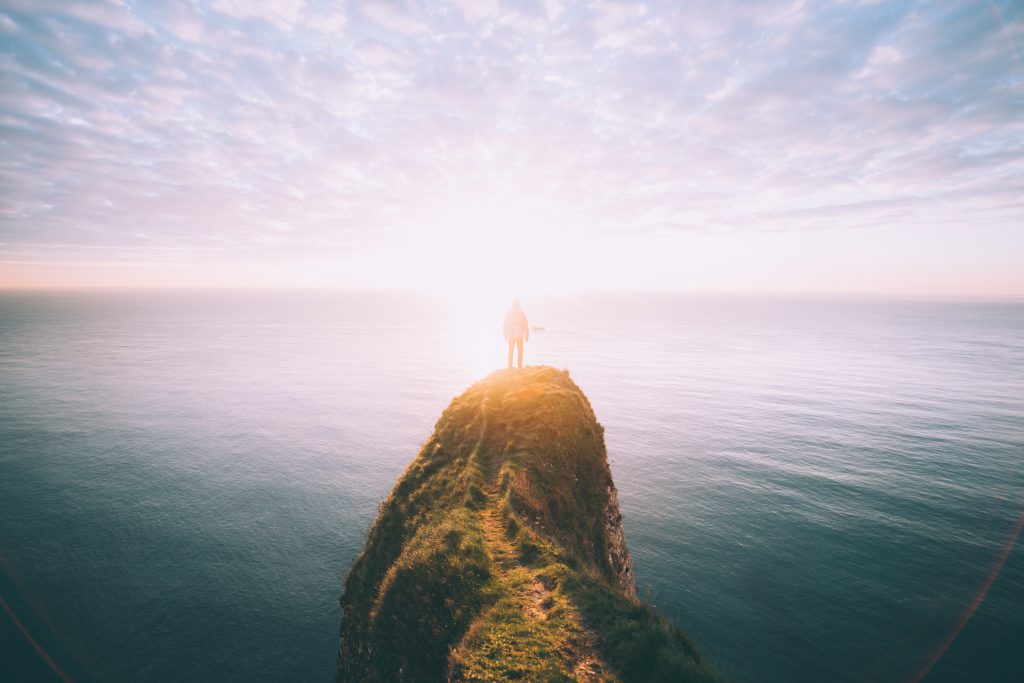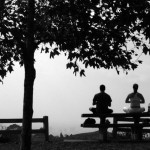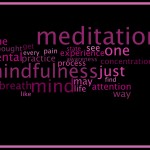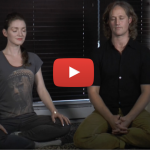“All men’s miseries derive from not being able to sit in a quiet room alone.” – Blaise Pascal
Do you ever feel lonely? Who doesn’t? We’re mammals after all and we were made to touch, dream, and be together. The older I get, the more true that feels to me.
But we live in a time when many of us feel more alone than ever. Why is that? I think there are a lot of valid reasons that are bigger than any one of us.
Of course, it really stinks when you feel lonely and isolated. But it’s important to know the difference between being alone and being lonely. Because there’s a big difference.
I’ve found over time that you can learn how to be happy when you’re alone. In fact, being alone can be incredibly nourishing. It can help you to be at ease with yourself. That might sound simple, but for many of us it’s not.
When you are truly alone, it can be creative and regenerative. And more importantly, it can help you connect to the profound silence that lives within you. Practicing meditation is one way that I learned how to be alone.
So what is the difference between being lonely and being alone? And how does meditation fit into this? I’ll answer that, but first I want to tell you a quick story about the Rocky Mountains, where I confronted my fear of being alone.
Confronting The Fear of Solitude
I discovered the difference between loneliness and being alone when I was about 20. I had driven 2000 miles across America to camp and mountain bike in the Rocky Mountains. I’d never seen big mountains before and the Rockies didn’t disappoint.
I made this pilgrimage alone, camping and mountain biking in the remote Colorado backcountry. I was a seasoned camper. But there was one thing I hadn’t planned for. And it caught me off guard. Can you guess what it was?
Solitude. And it scared the hell out of me.
I’ll never forget that first night when I was alone at a place called Lost Man’s Reservoir near Independence Pass high above Aspen. Framed by granite peaks, the dome of stars above seemed infinite. I, on the other hand, felt small, alone, and scared. I was far far away from everyone I knew and loved.
And I found myself asking, “How the hell did I get here? What am I actually doing?”
That night, I was more alone than I had ever been in my life. I felt like the last living person in the universe. Somehow, the truth of my aloneness penetrated all my defenses. It just cut through me. Being so alone scared me like nothing before. I felt like I was standing on the edge of a vast chasm about to fall in.
This was my first genuine introduction solitude.
Over the next several days, I veered back and forth between feeling scared and lonely to feeling a sense of promise in the solitude. And then something changed. As if the solitude was exerting an unseen pressure on me the whole time, the loneliness gave way like a damn breaking. A tide of ecstasy swept over me from some inner source, and it lasted for months. In truth, it changed me forever.
That was a turning point for me and the beginning of my meditation practice. Since that time, I’ve come to respect and appreciate the transforming power of being alone.
Discovering Wholeness In Being Alone
 My life changed after that. I had closed some deep gap between me and my own self. It was a division I didn’t even know was there. I know, that sounds really weird. But another way to say it is this. I discovered wholeness. I realized that I was totally alone in the universe.
My life changed after that. I had closed some deep gap between me and my own self. It was a division I didn’t even know was there. I know, that sounds really weird. But another way to say it is this. I discovered wholeness. I realized that I was totally alone in the universe.
But in that aloneness, I also realized directly that life was pulsing with a goodness that was so extreme it couldn’t be contained. It was infinite. And I knew that I was connected to that goodness. In fact, I was filled with an overwhelming certainty that I was made of that goodness.
Whatever energy animates our awareness, I became convinced that it is eternal and positive beyond measure.
So how does this relate to being alone? For me, being alone in this way showed me that I was a sovereign human being in control of my own future. And more importantly, I found that I was happiest in my own company. It’s not that I didn’t need or love others, but something was different now. I didn’t need others in the same way to be whole and happy.
Being alone became a source of creative renewal and it put me in touch with that rich well of silence and wholeness I discovered in the mountains.
If you haven’t have discovered the power of solitude for yourself, meditation is one way to find it. But first, let’s look at why we avoid being alone.
It’s Hard To Be Alone
 For many of us, it’s just hard to be alone. First, it can be hard to find the time, the place, and the circumstances to be alone. You have work, family, and all sorts of obligations. So there’s all that.
For many of us, it’s just hard to be alone. First, it can be hard to find the time, the place, and the circumstances to be alone. You have work, family, and all sorts of obligations. So there’s all that.
But also, we aren’t used to being alone. It requires slowing down. It means you aren’t looking for distraction (where’s my iPhone??). And because we tend to be a culture of hyper stimulation, that can be hard.
We’re so used to binging on just about everything. Many of us don’t embrace being alone. We’re just not that easy or content in the company of ourselves without distractions. In fact, for many of us, being alone makes us feel lonely.
Often, but not always, that’s because we don’t know ourselves very well. There’s a lot going on beneath the surface for each of us, and we don’t always want to know about it. But that’s the thing about real solitude. You can’t run from yourself. It’s all right there…all of you. Embracing all of yourself can be scary and daunting.
Historically, solitude has always played an important role in culture. It’s helped us to embrace both our strengths and weaknesses. Whether it was prayer or church or quality time in nature, we’ve had cultural institutions and values that supported spending time alone, removed from the buzz of life. Not so much any more.
So how can you embrace being alone?
How To Embrace Solitude Through Meditation

There are a few ways to think about this.
First, being alone can help you discover parts of yourself that you can’t connect with during your day-to-day. When you are focused, alone, and free from distraction, you can think more deeply and engage in the art of contemplation. You can sit with meaningful questions and let them unfold in the fertile field of undistracted awareness.
That’s very different than the kind of hyperactive thinking most of us are engaged in.
Second, I’ve found that meditation is a great way to cultivate a love for being alone. I believe the kind of aloneness you find in meditation can be transformative. Through meditation, you encounter a deep well of silence. That silence lives within you.
And the truth is, we all need to periodically connect with that silence. I think its’ a big part of who and what we are. And if we neglect it, it can be hard to feel whole.
I’m sure that’s one reason why my life changed so dramatically 20 years ago. I discovered that limitless silence within, and it was like an existential puzzle piece clicked into place. Of course, I had no idea it was missing until I found it.
These days, meditation is the primary way that I experience and commune with silence. Slowly, you let go of external stimuli. As your attention settles down, you then let go of internal stimuli. And that’s the whole journey.
You keep letting go on more subtle levels until there’s no more intermediary—not even your own mind. Then it’s just you and the universe. And eventually, even that distinction dissolves.
Eventually, it’s just you. There’s no inner and outer. There’s just being. That’s the deepest kind of solitude.
Mastering The Art Of Being Alone Through Meditation
Meditation is a deliberate way you can embrace solitude.
But it can also confront you with the parts of you that don’t want to be alone. And you need to be ready for that. It’s not a problem at all, but it’s part of the picture.
And if you’re like me, it might catch you off guard. You may have to go through a process of really slowing down like I did. But then you may find that it fills a hole and satisfies something that’s been missing for a long time. You see, many of us have lost our spontaneous connection to that rich source of inner silence.
Maybe you connect to that source in response to an amazing musical or theatrical performance. Maybe you find it in a piece of music or your creative process. But it’s also possible to cultivate a direct relationship to that solitude and silence.
When you let go in meditation, you are really alone. But not with your neurotic mind, which often reinforces loneliness and cuts you off from that nourishing silence. No, meditation can help you master the art of being alone.
Sitting there with nothing between you and totality, you encounter yourself, stripped bare, and whole. That’s what I love about it. Meditation is an act of radical self-acceptance and wholeness.
Do I still experience loneliness? Yes. But it’s different. It used to scare me and I’d contract. Now I know there is more to the picture. And that makes being alone–really and truly alone–a very different thing.
If you want to learn more about mastering the art of being alone, sign up for our free guided meditations.




Great read on meditation and being alone, not lonely.
Thanks Ali. Glad you liked it 🙂
I’ve recently been confronted with feelings of being alone due to radical changes in my environment. At first and for a long time it felt very uneasy, scary and caused me much anxiety, but recently i’ve started guided meditations and find that each day I am becoming more accepting of things just as they are and rather appreciating them. I have signed up for the meditation course offered here and can’t wait to start it!
Hi Avee, Thanks so much for sharing your experience around being alone. I think a lot of people could resonate with what you’re talking about here. And I’m happy you’re taking the course! Feel free to reach out and let me know if you have any questions as you go.